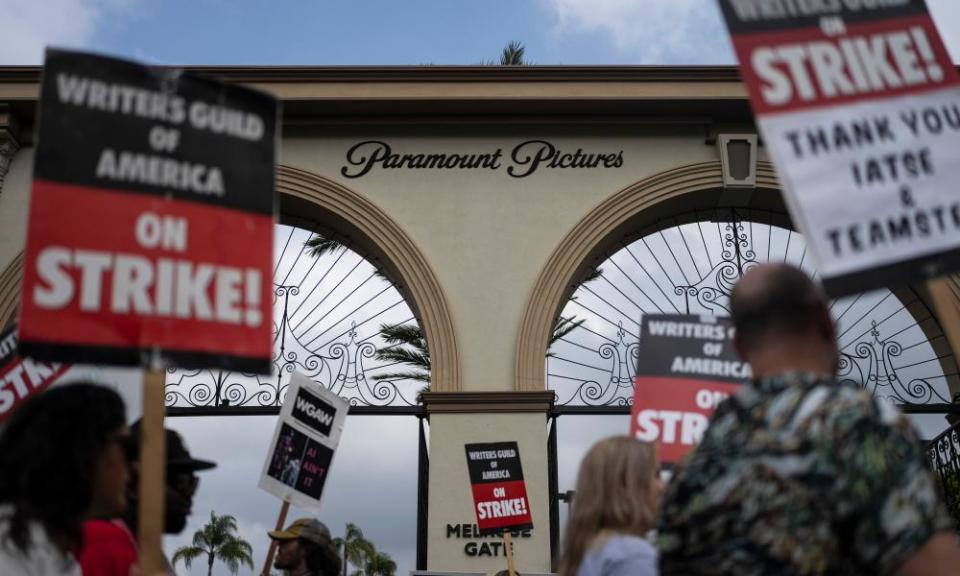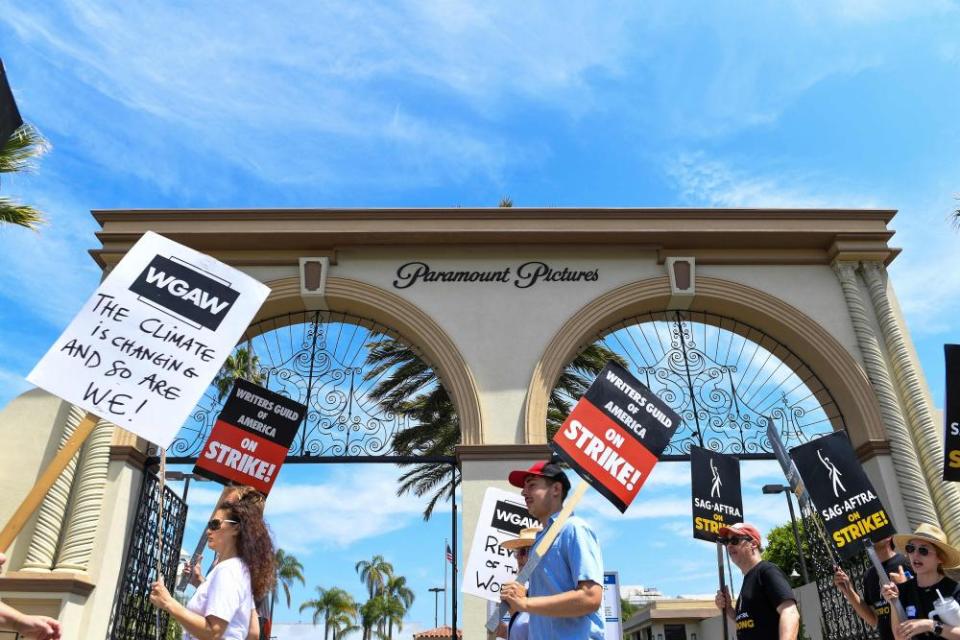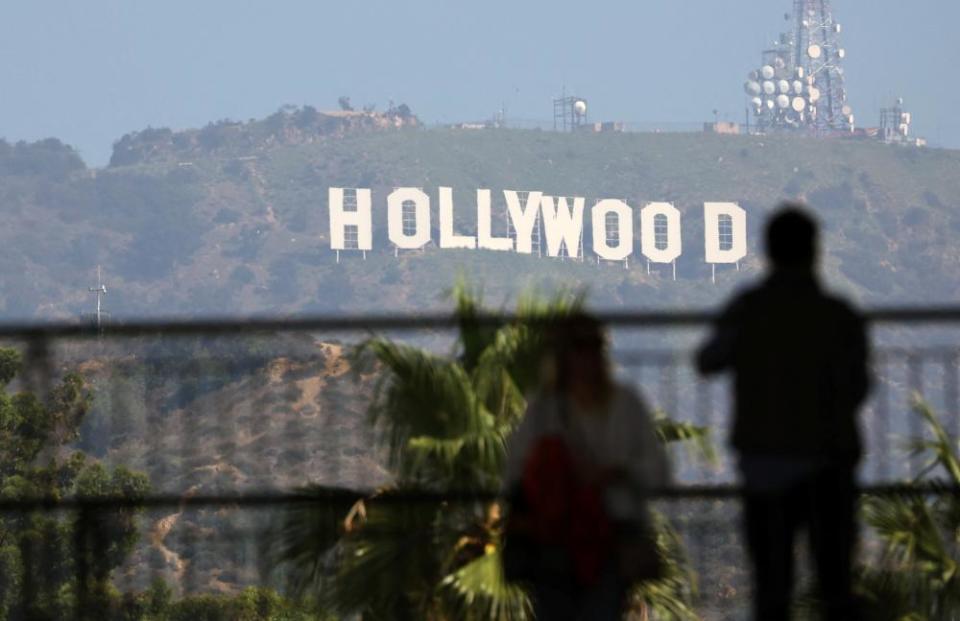How Hollywood writers triumphed over AI – and why it matters

Hollywood writers scored a major victory this week in the battle over artificial intelligence with a new contract featuring strong guardrails in how the technology can be used in film and television projects.
Related: Late-night comedy shows to return in early October after strike end
One of the longest labor strikes in Hollywood history came to an end on Tuesday after the Writers Guild of America (WGA) approved an agreement made with the Alliance of Motion Picture and Television Producers. Writers and actors had been picketing for months as part of a historic “double strike” that brought the industry to a standstill.
One of the most closely watched aspects of negotiations was the use of artificial intelligence, amid concerns from both writers and actors that unchecked AI could dramatically reshape Hollywood and undermine their roles, pitting artists against robots in a battle over human creativity.
With terms of AI use finally agreed, some writers are breathing easier – for now – and experts say the guidelines could offer a model for workers in Hollywood and other industries. The writers’ contract does not outlaw the use of AI tools in the writing process, but it sets up guardrails to make sure the new technology stays in the control of workers, rather than being used by their bosses to replace them.
The new rules guard against several scenarios that writers had feared, comedian Adam Conover, a member of the WGA negotiating committee, told the Guardian. One such scenario was studios being allowed to generate a full script using AI tools, and then demanding that human writer complete the writing process.
Under the new terms, studios “cannot use AI to write scripts or to edit scripts that have already been written by a writer”, Conover says. The contract also prevents studios from treating AI-generated content as “source material”, like a novel or a stage play, that screenwriters could be assigned to adapt for a lower fee and less credit than a fully original script.
For instance, if the studios were allowed to use chatGPT to generate a 100,000-word novel and then ask writers to adapt it, “That would be an easy loophole for them to reduce the wages of screenwriters,” Conover said. “We’re not allowing that.” If writers adapt output from large language models, it will still be considered an original screenplay, he said.
Simon Johnson, an economist at MIT who studies technological transformation, called the new terms a “fantastic win for writers”, and said that it would likely result in “better quality work and a stronger industry for longer”.
“I’m hoping it will be a model for the rest of the economy,” Johnson said.

While the new union contract allows writers to use tools like ChatGPT if they want to, and if the companies agree, writers cannot be forced to use AI technology, and companies have to disclose whenever they give writers material to work with that have been generated by AI tools.
The writers’ contract terms are “very smart”, because they allow writers to choose to use AI as a research tool, without undermining the credit or compensation they receive, Johnson said.
“AI is under control of the writers, not under control of the studios,” Johnson said. “It’s not to be used as an automation technology. It’s complementary to humans.”
The new contract is a model that workers in other industries should emulate when it comes to addressing AI, Johnson said, though he cautioned that it’s not clear if every union will have the power to win the kinds of protections Hollywood writers have done.
The union win on AI is also not a loss for the studios, Johnson noted, since they “will get a better product from this arrangement” than they might have otherwise.
A model for labor fights to come
Hollywood writers aren’t the first workers to fight for protection from AI, and they will not be the last. Experts warn the deal likely offers a preview of labor battles to come in other industries.
“This is the first step on a long process of negotiating and working through what generative AI means for the creative industry – not just writers but visual artists, actors, you name it,” says David Gunkel, a professor of media studies at Northern Illinois University and author of Person, Thing, Robot.
The protections are the first AI rules included in a WGA contract and come as entertainment companies are on a hiring spree for jobs related to research, development and management AI.
“All of the studios see the opportunity,” Dawn Chmielewski, the co-author of Binge Times, a book on Hollywood’s streaming wars, told the Guardian last month.
Meanwhile, the actors strike continues, with the studios and the actors’ union Sag-Aftra set to resume their contract negotiations next week. . The writers’ deal, which addresses similar concerns to those ofSag-Aftra, could provide a path forward.

The use of AI in the acting world has been a lightning rod issue, with growing concern about the use of digital likenesses – in essence, an AI double that productions could hire instead of a real actor. Earlier this year, Duncan Crabtree-Ireland, the guild’s chief negotiator, said studios had proposed paying background actors for a day’s work to use their images in perpetuity.
Efforts to adopt AI “as a normal operating procedure” are “literally dehumanizing the workforce”, the actor Bryan Cranston said recently on a picket line.
Conover, the WGA negotiating committee member, noted that the kinds of technology threatening the acting industry are very different from the large language model tools that writers were confronting, meaning that Sag-Aftra is negotiating over a substantially different set of problems.
One of the strengths of the WGA’s negotiating strategy on AI, he said, was that it cut through the marketing hype and fear mongering around what AI tool could possibly do in the future, and keep a focus on how studio executives might abuse the emerging technology in the present.
“We didn’t get bogged down in the science-fiction version,” Conover said. “We didn’t protect ourselves against the technology, we protected ourselves against the humans on the other side of the table who are trying to screw us every day.”
The Associated Press contributed to this report

 Yahoo Finance
Yahoo Finance 